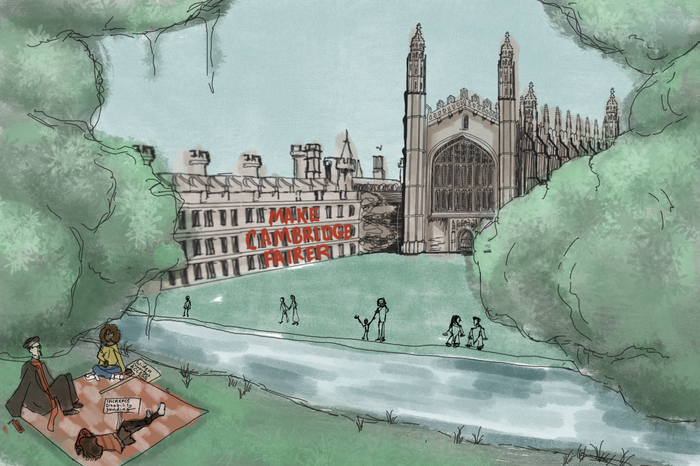London has a Cambridge problem
Elsie McDowell reflects on what it means to be a working class Londoner in a university that fuels the capital’s wealth inequality

I grew up on a council estate fifteen minutes away from the Shard, so I was no stranger to London’s stark wealth inequality. Although my local area is a textbook case study for inequality (literally), despite all visual reminders of it, it was in Cambridge that I felt London’s inequality most keenly. In many ways London is made up of two cities that inhabit the same geographical borders, but two entirely different social universes. And it is one particular social universe that has spilled over into Cambridge.
"I’m almost embarrassed to admit that I’m a Londoner; it feels like I’m part of the problem."
It is undeniable that students from London and the South East more broadly are overrepresented at Cambridge: 29% of offers in the 2023 admissions cycle went to students from Greater London alone. When someone asks me where I’m from, I’m almost embarrassed to admit that I’m a Londoner; it feels like I’m part of the problem.
At the same time, the London that I hear about on Cambridge’s cobbled streets does not always resemble the city I grew up in. Cambridge’s London is one of large suburban houses, city internships, and a handful of well-endowed grammar schools with a long list of Oxbridge alumni. The London of my inner-city state school was one of free school meals, long waiting lists for overcrowded council flats, and a growing child poverty problem. The two cities are often not physically separated but, for me, it was Cambridge that opened the door (or at least a window) into that other London that I had lived alongside for so long.
London is also a city that is rapidly changing. My local authority, Southwark, lost 18,000 council homes between 1994 and 2020. Some were lost to Right to Buy, but many were knocked down and replaced with luxury flats. In my lifetime, what was once a working class community has increasingly been broken apart. Formerly notorious council estates like the Aylesbury and the Heygate (the former had a habit of cropping up in my first year Sociology lectures…) have been replaced by an area that is almost unrecognisable as the one in which I was born and raised.
"Maybe in the time my local area has been gentrified, I have been too"
Every time I come home at the end of term, it looks less like the place that I think of myself as from. This makes me uneasy, because although I spent my school years rallying against this gentrification, Southwark, and London more widely, is changing in order to accommodate people like the Cambridge graduate that I will (hopefully!) become. By the time I graduate, I will have become the target audience for these new “quarters” and “districts” that replaced the very same estates that me and my friends grew up on. Suddenly, the coffee shops I sneered at seem like cosy study spots. Maybe in the time my local area has been gentrified, I have been too.
It is not easy to move between these two Londons. Whichever one I inhabit I feel out of place. Cambridge makes me feel like my life is no longer sufficiently working class to lay claim to it as an identity. But, in Cambridge, and the new London it has shown me, I always feel an underlying sense of discomfort that this is not the place for people like me, and even a slight disgust at the wealth it represents.
It is important to recognise, however, that inequality is no straightforward matter. There are many benefits of living in London that transcend socioeconomic status. Proximity to wealth, even if it is not your own, can bring its own opportunities. It is easier to access internships or further study in London than it is in most of the country; there is a reason why kids on free school meals in London are far more likely to go to university than those outside of it.
Equally, I am aware that as a student I see a particularly affluent realm of life in Cambridge. Indeed, it is not London but Cambridge, followed by Oxford, that is the UK’s most unequal city in terms of wealth. It may have been in Cambridge that I truly came to grips with London’s deep inequalities, but the wealth of the University often obscures the very same issues that London’s does. The sad reality is that the wealthier the place, the more unequal; the most “equal” cities in the UK are its poorest.
Above all, the prestige or reputation of a place can often conceal its inequalities. And, regardless of my own internal conflicts about what it means to call myself working class, being at Cambridge has propelled me into a world of privilege that benefits me immensely. London has almost become a dirty word at Cambridge, and there are many reasons to push against the University’s - and the country’s - overreliance on the capital. We also cannot forget that London’s stark inequalities continue to play out in Cambridge. I may have seen the inequality in London, but it is in Cambridge that I really feel it.
 Comment / Cambridge students are too opinionated 21 April 2025
Comment / Cambridge students are too opinionated 21 April 2025 Interviews / Meet the Chaplain who’s working to make Cambridge a university of sanctuary for refugees20 April 2025
Interviews / Meet the Chaplain who’s working to make Cambridge a university of sanctuary for refugees20 April 2025 News / News in brief: campaigning and drinking20 April 2025
News / News in brief: campaigning and drinking20 April 2025 Comment / Cambridge’s tourism risks commodifying students18 April 2025
Comment / Cambridge’s tourism risks commodifying students18 April 2025 Comment / Cambridge’s gossip culture is a double-edged sword7 April 2025
Comment / Cambridge’s gossip culture is a double-edged sword7 April 2025






